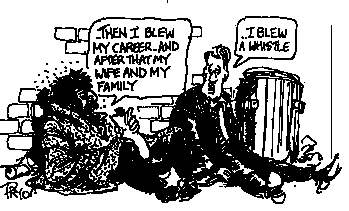
Brian Martin queries some widely held beliefs about whistleblowing.
email: bmartin@uow.edu.au
Go to
Norma, an accountant, noticed that funds in the company president's special account were being diverted to an overseas account. She reported this to the company's auditor.
Suddenly her access to accounts was removed, malicious rumours about her personal life and dishonesty were spread, co-workers avoided her and she was demoted. She got off easy!
Norma noticed that some sympathisers referred to her as a whistleblower. She hadn't thought of herself that way before. Norma was entering the realm of myths about whistleblowing.
MYTH 1: whistleblowing is dobbing. Dobbing, a derogatory term, usually means informing on a mate. Whistleblowing means speaking out in the public interest.
When Norma unwittingly stumbles across the boss's corrupt operations, is that dobbing? When residents participate in Neighbourhood Watch and inform police of break-ins, is that dobbing? When a witness reports a brutal assault, is that dobbing?
Dobbing simply is the wrong way to describe most cases of whistleblowing.
MYTH 2: whistleblowers always set out to be whistleblowers. Actually, a great number of them, like Norma, were just doing their jobs. They were conscientious and productive workers. They believed in the goals of the organisation.
When they saw evidence of corruption or dangers to the public, they reported it fully expecting the problem to be dealt with. They are incredibly shocked when they are attacked as a result.
Many of them still don't adopt the label of whistleblower, preferring to think of themselves as workers who were just doing their jobs.

MYTH 3: whistleblowers are malingerers, attention-seekers, radicals or ratbags. Actually, most whistleblowers are serious and hard-working. Many are conservative, socially and politically.
The only attention they usually desire is on the problem they are concerned about, not themselves. For their efforts, most of them come under sustained attack and suffer enormously, often spending large amounts of money defending themselves, experiencing serious health problems and break up of relationships.
MYTH 4: the best way to protect whistleblowers is through whistleblower legislation. Actually, it doesn't work. There are whistleblower laws on the books in several Australian states, yet there is not a single whistleblower known to have benefited from any of them.
South Australia's 1993 whistleblower act looks excellent on paper, but has never helped any whistleblower. But, ironically, the threat of using the act was invoked to shut down a whistleblower web site exposing abuses by WorkCover.
The United States has had whistleblower laws for much longer, with the same experience. The Office of the Special Counsel (OSC) was set up in 1978 as a formal channel for whistleblower disclosures. Congress has repeatedly amended the laws because they have not been working, being undermined by OSC administrators.
Tom Devine of the Government Accountability Project and author of the authoritative The Whistleblower's Survival Guide, concludes that "flaws in the system mean that an OSC whistleblowing disclosure is likely to be unproductive or even counterproductive." In other words, the OSC on balance has been useless or harmful.
Some critics have argued that whistleblower laws are passed by governments to give the appearance of action without the substance. That's certainly what seems to have happened.
MYTH 5: official channels are available to deal with problems reported by whistleblowers. Official channels include internal grievance procedures, appeal bodies, ombudsmen, courts, human rights commissions, antidiscrimination bodies, anticorruption commissions and parliaments.
Whistleblower researcher Dr William De Maria surveyed hundreds of whistleblowers. He found that official channels helped in less than one out of ten cases. In many instances, official channels were actually harmful.
Whistleblowers Australia has contacted dozens of whistleblowers who have made complaints to the NSW Independent Commission Against Corruption, and has found only one who was helped at all.
Dr Jean Lennane, president of Whistleblowers Australia, has concluded it would be better to abolish ICAC. She is not the only one to reach this surprising conclusion.
Dr Lennane also thinks that any anticorruption body should have a finite life of about three years, since it can't be expected to be any use after that even if it was before.
Many workers in appeal bodies do their best. The problems arise due to serious overload, cumbersome bureaucratic procedures, limited mandate, government cut-backs (especially of agencies that seriously challenge corruption), and accommodation with the system.
Many of those with lots of experience talking to whistleblowers have concluded that there are only two things that reliably help. The first is talking to other whistleblowers. The other is publicity, especially media coverage.
It should not be a surprise, then, that most whistleblower legislation seeks to discourage people from going to the media.
Whistleblowers speak out in a way that challenges vested interests. Whistleblowing is threatening to both the vested interests and to many of those who are complicit or afraid of the consequences of speaking out.
Hence it isn't surprising that myths about whistleblowing abound. It is just too threatening to recognise what is going on.
Dr Brian Martin is associate professor in Science, Technology & Society at the University of Wollongong, International Director of Whistleblowers Australia and author of The Whistleblower's Handbook (Sydney: Envirobook).